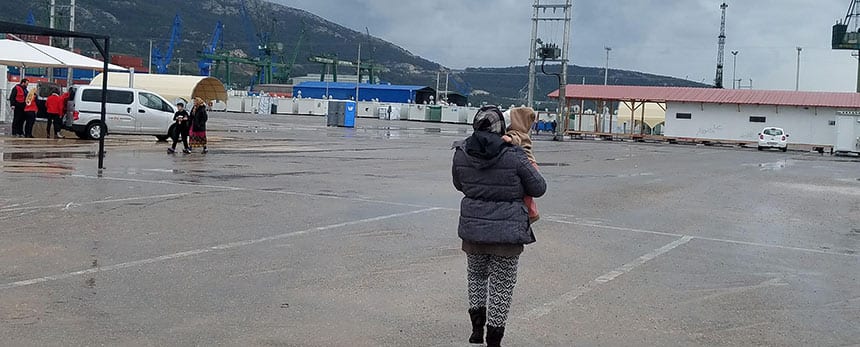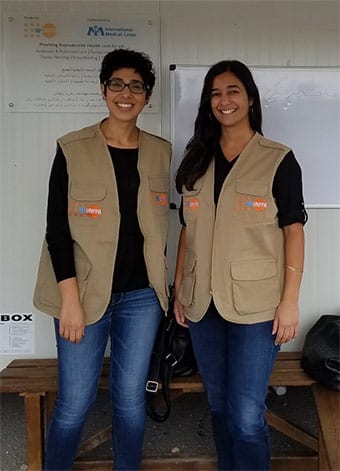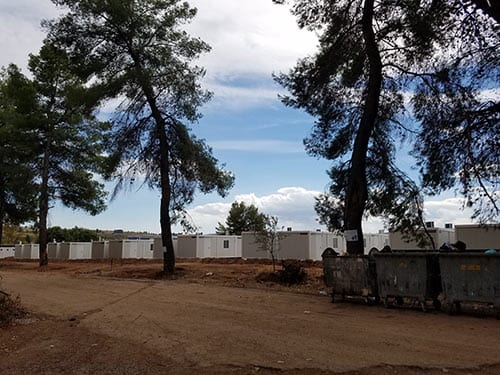
By Andrea Lampros
From her office at the United Nations Population Fund in Athens, the Human Rights Center’s (HRC) Julie Freccero took a trouble-shooting call: A Syrian refugee living in one of the camps north of Athens was being severely abused by her husband.
With no gender-based violence service provider to offer support or a safe house within the boundaries of the spare refugee camp, she was trapped and afraid.
Freccero knew she had to respond quickly—a similar case the previous week resulted in a woman choosing a perilous journey with a smuggler. She immediately called on a colleague in the government social welfare agency to connect the woman to the nearest domestic violence counseling center to secure space in a shelter.
“This just shows how desperate the situations are,” said Freccero. “For a lot of people, going to a shelter is scarier than the risks of traveling illegally with a smuggler to another country where you feel you have other family support.”
Freccero just served a short-term, six month United Nations Population Fund mission in Greece to coordinate and improve the response to gender-based violence in the refugee camps. As associate director of HRC’s Sexual Violence Program, her work leverages the center’s research expertise, which has focused on gender-based violence in forced displacement settings since 2012—as well as accountability for wartime sexual violence.
On the front lines

Some 60,000 refugees—mainly from Syria, Afghanistan, Iraq and conflict zones in Africa—remain in Greek refugee camps scattered from Athens to pockets in the north and to islands such as Lesvos and Chios. The number of refugees is partly due to the agreement struck last year between the European Union and Turkey that effectively halted the flow of refugees through Greece to other European countries.
The backdrop of the crisis is an already beleaguered Greek economic situation, overtaxed health and social welfare infrastructure, and limited resources. As life stagnates in the camps—especially on the islands where the camps are more like detention centers—researchers say incident reports of gender-based violence are increasing.
Freccero has worked on several fronts to improve the response to gender-based violence and access to sexual and reproductive healthcare for refugees in Greece.
She collaborated with Oxfam’s Gender Lead, Nina Gora, to write a briefing paper on women’s rights in Greece’s refugee crisis; host a round-table discussion with government and NGO leaders; and spearhead a groundbreaking Call to Action. The action pushed three priorities: improving gender-based violence prevention and response as a life-saving intervention; increasing access to sexual and reproductive health services; and promoting women’s participation and empowerment.
One goal of Call to Action is to help aid organizations and the Greek government focus on critical priorities in 2017. The advocacy initiative has already spurred a United Nations High Commissioner (UNHCR)-led working group on shelter to create new guidelines for how camps are built and organized in order to lessen the risks of gender-based violence and improve camp safety. This includes installing better lighting throughout the camps and locating bathrooms closer to living spaces.
“With so many immediate needs right in front of you that you have to address, making the time to step back to do the advocacy is hard, but it’s important,” said Freccero.
Working closely with the General Secretariat for Gender Equality, Freccero also trained government counselors and shelter providers in the Greek islands where reports of domestic and sexual violence are on the rise. She drew on the lessons from HRC’s Safe Haven study in Thailand, Kenya, Haiti, and Colombia, tailoring it to Greece’s particular needs.
Lessons learned
Freccero, who has a master’s degree from Berkeley’s School of Public Health, sees an urgent need to support the Greek government in making services more accessible to refugees and migrants and interpretation at shelters and counseling centers more readily available. She took a particular interest in urban “squats” that are often self-run by refugees in abandoned schoolhouses or old buildings.

“Some of them are really well-run, and there’s a strong sense of community. The environment was surprisingly positive, given the circumstances,” Freccero said . “People who had never met each other before arriving in Athens are cooking together, playing music and caring for each other’s children.”
Drawing lessons from these squats, Freccero saw the promise of “cash transfer” programs that give funds directly to refugees in the camps to use for their particular needs. She says cash in the hands of refugees supports personal autonomy as well as the local economy. However, specific measures are needed to ensure that both women and men equally participate in and benefit from cash transfer interventions—a challenge that Freccero addressed with colleagues at CARE and Oxfam by issuing “gender-sensitive guidelines.”
Illuminating the shortcomings of the global humanitarian response in Greece, Freccero highlighted the situation of a young Syrian mother who became a friend.
In her mid-twenties, pregnant with twins, and traveling on her own with two young children, authorities determined the woman was “vulnerable” and sent her by ferry from Lesvos to the Piraeus Port in Athens. She eventually made her way to one of the squats and later gave birth at an Athens hospital. She returned to the informal camp without any post-natal care or support, nursing her babies on a mattress on the floor while recovering from a C-section. In these harsh conditions, the other refugee women living alongside her provided her with all the care and support they could.
Freccero says the refugees in the informal squat settlements are, in many ways, more vulnerable, because they do not receive much of the support—whether that’s food, toiletries, blankets, or other practical items—provided to those in the camps. Because of her observations and recommendations, UNFPA is now prioritizing the distribution of dignity kits, which include basic items such as bras, underwear, feminine hygiene products, warm socks and fleece blankets for winter, to these urban sites.
The executive director of HRC, Alexa Koenig, Ph.D. ’13, J.D., said Freccero’s deployment has been bittersweet. “We’ve missed Julie here in Berkeley, but the insights and experience she’s gained in the heart of the refugee crisis are invaluable for making sure our work is as responsive as possible to needs on the ground.”
Research foundation
With Freccero on the ground in Greece, HRC’s Sexual Violence Program Director Kim Thuy Seelinger supervised several Berkeley Law students in preliminary research on protection needs of unaccompanied refugee children and LGBTQ refugees in the Middle East, North Africa, and Europe. These current and former students include Richard Weir ’16, Jessica Caplin ‘16 , Darby O’Connell ’17, Tara Brailey ’17, Maria Fernanda Jordao Evita LL.M, ’17, Lydia Sinkus ’17 and Aaron Murphy ’17.
Desk research conducted by these law students is building a foundation for the Sexual Violence Program’s larger projects in the months ahead.
Caplin worked with Seelinger and Freccero for more than a year, conducting research on the risks of trafficking and sexual and gender-based violence for refugees along the so-called “Balkans route” through Europe.
“Faced with over 65 million displaced women, men and children around the world, it is critical that the global community responds, not just with emergency aid, but also with the types of meticulous research and study perfected by the Human Rights Center,” Caplin said. “We cannot hope to provide durable solutions for the most persecuted without first hearing their voices and identifying their needs, and the latter is what Kim and her team do so well.”
Members of the law school’s student-run pro bono group, the International Human Rights Workshop, also partner with the Human Rights Center under Seelinger’s supervision. Students conduct legal research to support projects related to refugee crises in Europe, Asia, and Africa, as well as the prosecution of sexual violence-related charges in international crimes cases.
Home page photo: New Refugee Arrivals – Greek Island of Lesvos, by Steve Evans.